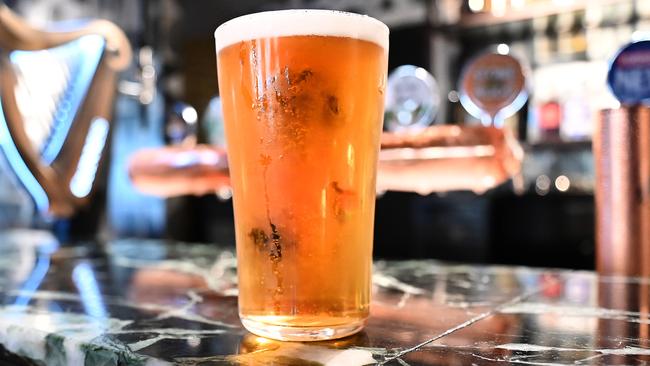‘Sympathetic to the punters’: Coalition mulls changes to beer excise
Sympathetic to pubs and punters who have faced continued alcohol price hikes, Sussan Ley flagged the opposition is considering changes to alcohol excises.

The Coalition is contemplating changes to alcohol excises, deputy opposition leader Sussan Ley has flagged, as surging price hikes dent consumer demand and give rise to bootleg booze.
“We’re looking at everything when it comes to tax, and we always say that under our side of politics, taxes will be lower, simpler and fairer,” Ms Ley told Adelaide radio on Friday when asked about tax settings on alcohol.
“I’m very sympathetic when I speak to not just the people who run the pubs, it’s the punters who go in there for a couple of quiet, cold ones at the end of the day.
“They’ve worked all day in the hot sun, they’re just having a couple on the way home, and it’s becoming unaffordable.”
Australia has some of the highest alcohol taxes in the world, with spirits subject to $103.89 excise per litre of pure alcohol, while beer faces a levy of as much as $61.32 per litre.
Alcohol prices are slated to rise again in February when the next biannual excise increase takes effect, with the change pegged to the annual inflation rate, currently 2.1 per cent on most recent measure.
However, forecast revenue from spirit and alcohol excises was downgraded by $1.9bn over the next four years, according to December’s mid-year economic and fiscal outlook, as soaring taxes crimped consumption while driving growth in the black market.
The rise of bootleg booze is evidenced by the Australian Taxation Office’s estimates of the so-called “tax gap” – the difference between actual tax paid and the projected revenues if everyone was fully compliant with the law – which was almost $800m for spirits and beer in 2022-23.
Around $710m, or 88.8 per cent, of the unreported alcohol duty was due to illicit activity in the black market or “shadow economy,” the ATO has calculated.
Alistair Coe, executive director of Alcohol Beverages Australia, a lobby group for drink manufacturers, distributors and retailers, warned the biannual excise increase was a “blunt policy instrument” that was encouraging the production and sale of illicit alcohol.
“Not only is the commonwealth losing considerable revenue, but the illicit alcohol sold can be quite dangerous,” Mr Coe said.
Last year, Victoria Police and the ATO uncovered a billion-dollar liquor substitution racket in which crime syndicates mixed denatured spirits – such as those used for paint strippers – with whisky, vodka and other top-shelf spirits.
The bootleg booze was subsequently sold at a host of pubs, nightclubs and music festivals, and law enforcement estimates 2.4 million bottles of illicit alcohol enter the market annually.
John Preston, chief executive of the Brewers Association of Australia, representing leading beer producers Carlton and United Breweries, Lion and Coopers, warned the excise hikes were having a significant impact on manufacturers and hospitality venues alike.
“We’ve certainly seen a significant transfer of people moving away from going to the pub to just drinking at home,” he said.
“We really think the government needs to step in and cut that tax.”




To join the conversation, please log in. Don't have an account? Register
Join the conversation, you are commenting as Logout